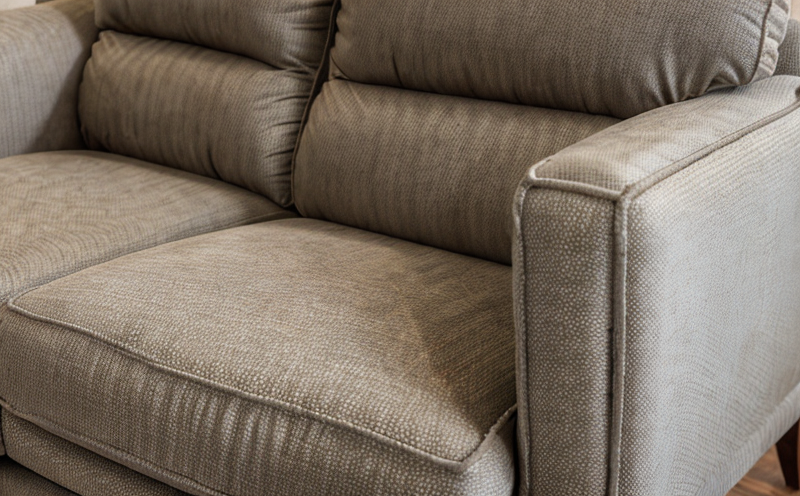Fire Resistance Testing of Knitted Textile Upholstery
Furniture and upholstery are critical components in residential, commercial, and public spaces. Ensuring that these materials meet fire safety standards is paramount to protecting lives and property. Fire resistance testing for knitted textile upholstery plays a crucial role in this effort by evaluating the flammability of textiles used in furniture. This test ensures compliance with regulations set forth by various national and international standards.
The need for such testing arises from the increasing use of synthetic materials, which can burn more readily than natural fibers. Knitted textile upholstery is particularly vulnerable due to its structure, which can easily trap air and facilitate combustion. Compliance with fire safety standards not only protects users but also helps manufacturers avoid potential legal issues.
The European Union's regulations on furniture flammability are stringent and require that upholstered items must pass rigorous tests before being placed on the market. The EU has implemented directives such as Regulation (EU) 2015/304 to ensure that all furniture sold in EU member states meets the necessary fire safety requirements.
This service focuses on the testing of knitted textile upholstery, ensuring that it can withstand ignition and resist burning for a specified period. This test is conducted using industry-standard equipment like the Cone Calorimeter (EN 13826) or the Vertical Flame Test (ISO 14326). The goal is to determine how quickly the material ignites, how much heat is released during combustion, and how long it takes for the flames to extinguish once they are removed.
Properly conducted testing ensures that upholstered furniture does not pose a fire hazard. This service also includes detailed reporting of test results, which can be used by manufacturers to make informed decisions about material selection and design modifications.
The process begins with the preparation of specimens according to the specified guidelines in the relevant standards. Once prepared, these samples are subjected to controlled ignition sources to simulate real-world fire conditions. The performance metrics include time until ignition, peak heat release rate, smoke production, and residual mass after combustion.
Scope and Methodology
| Parameter | Description |
|---|---|
| Ignition Source | Flame or other appropriate heat source as per standard. |
| Test Specimen | Knitted textile upholstery samples according to specified dimensions and weight. |
| Temperature Control | Maintained within ±2°C of the required temperature. |
| Ignition Duration | Controlled to ensure consistent testing conditions. |
| Data Recording | Includes peak heat release rate, total heat release, and time to ignition. |
The testing process is designed to simulate real-world fire scenarios. The specimen is placed in a controlled environment where it is subjected to an ignition source. Observations are made of the material's behavior under these conditions, including how quickly it ignites, how much heat it releases, and its ability to extinguish once the flame is removed.
The data collected during testing is analyzed according to the relevant standards to determine whether the specimen meets the required fire resistance criteria. This analysis includes calculations of parameters such as the Heat Release Rate (HRR), Smoke Production Index (SPI), and Mass Loss.
Eurolab Advantages
At Eurolab, we pride ourselves on providing top-tier services that meet or exceed industry standards. Our expertise in fire safety testing ensures that your knitted textile upholstery specimens are tested rigorously according to the latest regulations.
- Comprehensive Testing Capabilities: We offer a wide range of tests tailored to various materials and applications.
- State-of-the-Art Equipment: Our laboratory is equipped with advanced testing instruments that adhere strictly to international standards.
- Experienced Staff: Our team comprises highly skilled professionals who are well-versed in the latest testing techniques.
- Timely Reporting: Results are provided promptly, ensuring you have timely access to critical information for decision-making.
We understand that compliance with fire safety regulations is crucial for your business. Eurolab's commitment to excellence ensures that every test conducted meets the highest standards, providing peace of mind and confidence in your product quality.
Environmental and Sustainability Contributions
- Eco-friendly Testing Procedures: Our testing methods are designed with environmental considerations in mind, minimizing waste and energy consumption.
- Sustainable Reporting Practices: We use digital reporting systems to reduce paper usage and enhance data accessibility.
- Energy Efficiency: Our laboratory operations are optimized for energy efficiency, contributing to lower carbon footprints.
By offering fire resistance testing services that meet the highest standards, we contribute not only to public safety but also to environmental sustainability. Our commitment to sustainable practices aligns with the broader goals of reducing waste and promoting responsible resource use in manufacturing processes.





